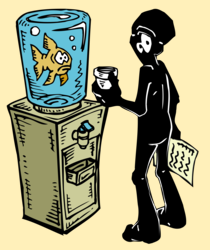 Behavioural economist Dan Ariely sets out to convince us that we consistently behave in irrational ways in his book Predictably Irrational: the Hidden Forces that Shape Our Decisions. When we see a list of items and prices, we tend to assess the value of the items by reference to the prices of the other items on the list, rather than by objective criteria, and vendors can use this to influence our purchase decisions. We tend to fall for an offer which looks attractive relative to the other available offers, and we fail to assess its value relative to everything else that is important in our lives.
Behavioural economist Dan Ariely sets out to convince us that we consistently behave in irrational ways in his book Predictably Irrational: the Hidden Forces that Shape Our Decisions. When we see a list of items and prices, we tend to assess the value of the items by reference to the prices of the other items on the list, rather than by objective criteria, and vendors can use this to influence our purchase decisions. We tend to fall for an offer which looks attractive relative to the other available offers, and we fail to assess its value relative to everything else that is important in our lives.
We also have an irrational attraction for “free” offers. When presented with a free offer and a low-cost offer which actually represents better value, we almost always choose the free offer. There are many things in life that we are happy to do for free — as charitable acts or to fulfil our social obligations — that we would not be prepared to do if someone offered to pay us for them. When a monetary value is put on an such an action, we will refuse to do it if the value is too low, even if we have happily done it before for nothing.
These are just a few of the many irrationalities which the author discusses in the book, always in the context of entertaining — and sometimes ethically questionable — experiments which he has conducted. The book is engaging and fun to read, but it also offers some important insights into why we do the things we do, and how behaviour which is illogical can still be highly predictable.